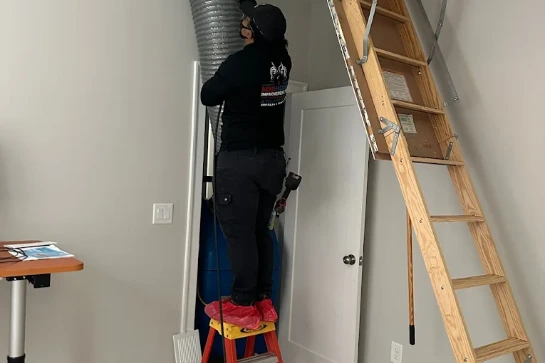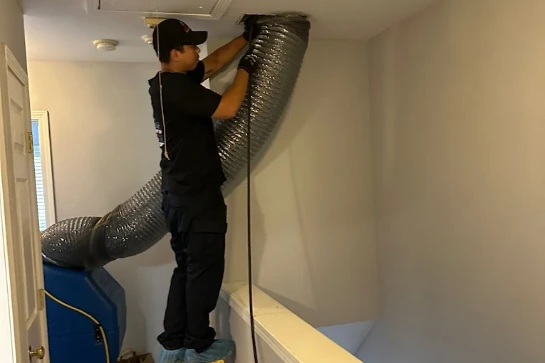I remember one very scary morning when my house felt like it was haunted. I woke up and saw dust piled up everywhere, and a strange musty smell filled every room. Then, I felt so sick that my allergies started acting up, and I could hardly breathe. I later learned that my HVAC system, the big machine that heats and cools the house, had not been cleaned for a long time. This neglect caused the system to circulate dirty air throughout my home, illustrating how much HVAC affects air quality. It was like my house was trapped in a never-ending dust storm!
That day taught me that taking care of your air system is very important for healthy breathing. Now, I make sure to clean or change the filters and check my system often, so I don’t have to live through another scary, dusty day. However, if you want Indoor Air Quality Testing in Smyrna, contact MMI.


What is HVAC?
Imagine your home is like a big room where you need to control the temperature and the air you breathe. The HVAC system is like a team of helpers that do three important jobs:
- Heating: It makes your home warm during cold days.
- Ventilation: It brings fresh air from outside and pushes out the old, stale air.
- Air Conditioning: It cools your home on hot days.
When we say “air quality,” we mean how clean or polluted the air is. Good air quality means the air is clean and safe to breathe.
How Does HVAC Help Keep the Air Clean?
1. Air Filters
One of the most important parts of an HVAC system is the air filter. Think of an air filter like a sponge that soaks up dirt and tiny particles floating in the air. These particles can include dust, pollen, and pet hair. The filter catches these particles so they do not go into your home.
- Simple Fact: When the filter gets too full of dirt, it can’t catch more particles. This is like a sponge that is too wet; it cannot soak up any more water.
2. Fresh Air Exchange
Another job of the HVAC system is to bring in fresh air from the outside and remove the old air from inside your house. This is called ventilation. It helps keep the air in your home fresh.
- Example: Imagine you have a classroom that gets stuffy if no one opens the windows. HVAC systems work like open windows that let fresh air in and push stale air out.
3. Controlling Humidity
Humidity is the amount of water in the air. If the air is too wet, it can feel sticky and may help mold grow. If it is too dry, it can make your throat and skin feel uncomfortable. The HVAC system helps control humidity so that the air feels just right.
- Fun Fact: Most people feel comfortable when the humidity is between 40% and 60%.
4. Clean Ducts
Air ducts are like tunnels that carry air from the HVAC system to different parts of your home. If they get dirty or leak, they can let in dust and other unwanted particles.
- Idea: It’s important to keep ducts clean so that only good, clean air flows into your rooms.
Common HVAC Issues That Affect Air Quality
When an HVAC system is not taken care of, it can cause problems with the air quality in your home. Here are some common issues:
1. Clogged Air Filters
If you do not change or clean your air filters often, they can get clogged with dust and dirt. This means:
- The filter cannot catch new particles.
- Dust may start to blow out into your home.
- Your HVAC system has to work harder, which can make your energy bills higher.
2. Leaky Ducts
If the ducts are not sealed properly, dirty air can sneak into your home through small cracks. This makes the air less clean and can even bring in allergens from places like attics or basements.
3. Poor Ventilation
If your HVAC system is not working well, it might not bring in enough fresh air. This can make the air inside your home feel stuffy and could cause headaches or tiredness.
4. Unbalanced Humidity
If the humidity is not controlled, it might be too high or too low. High humidity can help mold and mildew grow, while low humidity can dry out your skin and throat.
By incorporating indoor air quality testing services, homeowners can proactively identify and address HVAC issues that compromise air quality, leading to a healthier and more comfortable living environment.
Read Also: Key Causes of Poor Indoor Air Quality You Should Know
Why is Good Air Quality Important?
Good air quality is very important for our health. When you breathe in clean air, you feel better and can concentrate more in school. Here are some benefits of good indoor air quality:
- Better Health: Clean air helps keep your lungs and heart healthy.
- Fewer Allergies: Removing dust and pollen from the air can reduce sneezing and other allergy symptoms.
- More Energy: When your HVAC system works well, it uses energy efficiently, which can save money.
- Comfort: You will feel more comfortable at home when the air is neither too hot, too cold, too dry, nor too wet.
How Can You Help Keep Your HVAC System Working Well?
Even though adults usually take care of the HVAC system, there are things you can do to help keep the air in your home clean:
1. Remind Adults to Change Filters
Ask your parents or guardians if they have checked the air filters recently. Remind them that changing or cleaning the filters on time helps the HVAC system work better.
2. Keep Your Home Clean
Dusting your room, vacuuming, and keeping things organized can help reduce the amount of dust that your HVAC system has to clean.
3. Report Problems
If you notice that your room feels stuffy or that there is too much dust around the vents, let an adult know. The HVAC system or ducts may need to be checked if this happens.
4. Learn More
Talk with your teachers or family about how HVAC systems work. Sometimes, learning about science can help you understand how things around you make a difference in your health.
Taking care of your HVAC system is like taking care of a pet or a favorite toy; it needs regular care to work its best. By understanding how HVAC affects air quality and helping with simple tasks at home, you play a part in keeping your environment healthy. Clean air is important for good health, learning, and happiness.

